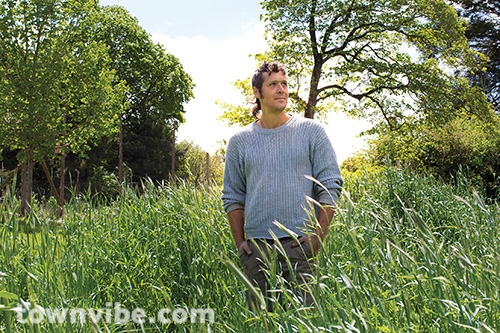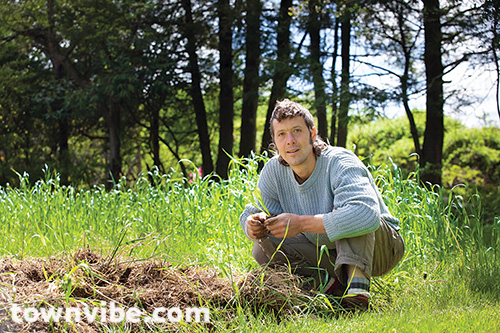
When I heard that Bedford farmer Doug DeCandia bought 20 tons of trap rock dust for his fields, I couldn't figure out what that had to do with a productive garden. Plus, why was he digging dirt from around skunk cabbage and also leaving some weeds growing near food crops?
It's all about growing better food. Five years ago, DeCandia learned about the Bionutrient Food Association (BFA) and was so convinced of its efficacy for growing nutrient-dense food that he founded a local chapter here, in Bedford, to spread the word. It's the latest approach to gardening, but there's really nothing new about it; Mother Earth has been doing it all along, well, that is, when she's given the chance to maintain plant diversity and healthy soil. The bionutrient approach pays attention to minerals, trace elements, and good bacteria in the soil, giving the plants room to grow along with plenty of cover crops.
Why add rock dust, dirt from skunk cabbage, and weeds to the garden? Rock dust is where soil comes from via a natural, "slow garden" process. Adding the dirt around virile skunk cabbage into the garden bed inoculates the soil with beneficial bacteria. The weeds' root systems contribute humus and beneficial organisms. Just like our gut needs good bacteria to keep us healthy, so, too, the soil needs it to feed the plant. That's how good food is produced. Furthermore, new research claims that there's a connection between our gut and our mind. That makes good soil a "yes-brainer!"
"Organic" was a stepping stone in this direction, but, sorry, it does not guarantee nutrient-dense or delicious food. With attention to the soil and other factors, we can raise organic practices to a higher level to produce nutritious, disease-resistant crops with higher yields.
 The local BFA meetings begin with a potluck dinner that rivals any farm-to-table restaurant: eggs from pasture-raised chickens, fermented organic vegetables, homemade kombucha. The potlucks are followed by a themed discussion led by DeCandia. Networking can be frenzied, and the camaraderie is palpable, as farmers discover a deeper meaning in their livelihood and connect with other like-minded growers. Along with the BFA's mission to produce healthier food, healthier people, and a healthier planet, the basic tenets of bionutrient farming align with cultural ethos: diversity, allowing room to grow, survival of the fittest, and respect for nature.
The local BFA meetings begin with a potluck dinner that rivals any farm-to-table restaurant: eggs from pasture-raised chickens, fermented organic vegetables, homemade kombucha. The potlucks are followed by a themed discussion led by DeCandia. Networking can be frenzied, and the camaraderie is palpable, as farmers discover a deeper meaning in their livelihood and connect with other like-minded growers. Along with the BFA's mission to produce healthier food, healthier people, and a healthier planet, the basic tenets of bionutrient farming align with cultural ethos: diversity, allowing room to grow, survival of the fittest, and respect for nature.
There's a ground swell for this approach in the Hudson Valley, thanks to DeCandia. He runs the Food Bank of Westchester's farm and agricultural education program on five primary growing sites in Westchester County. What excites him is that this is a "holistic, natural approach to gardening and farming that makes the whole process of growing food and medicine easier while at the same time regenerating the health of the land and ourselves."
Mike Fedison, the Farm Manager at Purdy's Farmer and the Fish, is using bionutrient farming techniques to grow food onsite. The restaurant has been in business for four years and is committed to establishing healthy soil which can improve yields and increase nutrition. Mike is growing on only two acres, and they have a busy restaurant to supply, so he says "we have lots of incentive to increase productivity."
Mimi Edelman's I and Me Farm incorporates BFA practices in her fields. She has RSA (Restaurant Supported Agriculture) relationships with Restaurant North in Armonk and Kittle House Restaurant and Inn in Chappaqua where she also maintains an herb and vegetable garden. Mimi's new venture this season is growing organic, biodynamic cut flowers. Her Harvest Community Project will be reaching out to the BFA community to help feed lower income and elderly Bedford Hills neighbors by "taking the local food distribution process into our own hands."
She farms on leased land in Bedford that's set aside for conservation via the Farmland Match Program headed up by Kate Sann of the Westchester Land Trust (WLT), which hosts many of the BFA meetings. When Sann first attended a BFA Workshop run by founder Dan Kittredge several years ago, she said she felt like she was at a church revival. The mission of the farming group couldn't be more down to earth, literally, and aligns with that of WLT, whose mission is to preserve the land.
This article appears in the July/August 2016 issue of TownVibe Bedford.

